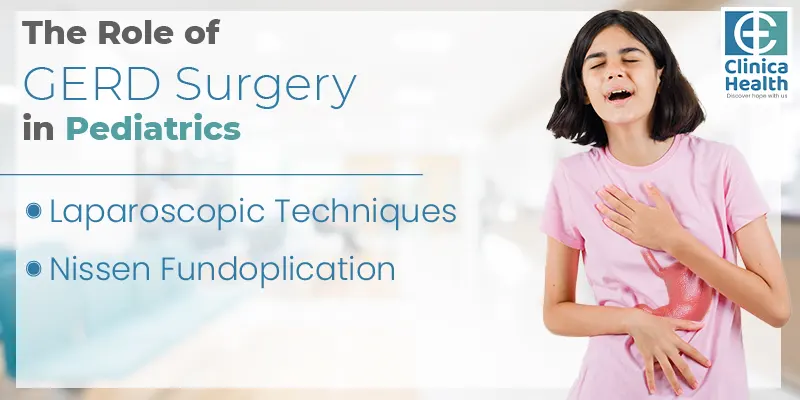-
 Call Now:
8010 552 552
7595 838 844
Call Now:
8010 552 552
7595 838 844
-
 Email Me:
[email protected]
Email Me:
[email protected]
Gastroesophageal reflux disease (GERD) can significantly impact the quality of life of paediatric patients, leading to various complications. While lifestyle modifications and medications are often the first line of defence, there are cases where surgical intervention becomes necessary. In this blog post, the context will delve into the impact of GERD surgery in paediatric patients and explore how it plays a crucial role in managing comorbidities associated with this condition.
GERD is a chronic condition where stomach acid flows back into the oesophagus, causing discomfort and potential damage. It is important to comprehend that paediatric GERD can manifest in various ways, such as frequent vomiting, difficulty swallowing, and respiratory issues. Hence, to combat these complications, an expert healthcare professional may recommend lifestyle changes and medications as common initial treatments, but some cases may require surgical intervention.
Here is a detailed role played by surgical intervention among paediatric patients dealing with GERD:
Being one of the top recommendations of most surgeons, laparoscopic treatment as GERD surgery is a minimally invasive approach which is often preferred in paediatric cases. Moreover, as per a renowned laparoscopic surgeon, Dr. Purnendu Bhowmik, this surgical procedure involves shorter recovery times and reduced postoperative pain compared to traditional open surgery.
Another surgical procedure for GERD in children, Nissen fundoplication, involves wrapping the top of the stomach around the lower oesophagus to prevent acid reflux. This treatment procedure is effective in reducing symptoms and improving the overall quality of life.

Let’s delve into the effective management of comorbidities of GERD among children:
The complications of GERD can alleviate respiratory symptoms caused by aspiration of stomach contents. Thus, timely intervention with the healthcare specialist improves lung function and reduces the risk of recurrent respiratory infections.
Children with GERD may experience poor weight gain. In this case, doctors often recommend surgery that helps in resolving feeding difficulties, promoting proper growth and development.
Surgery prevents the progression of esophageal strictures, reducing the need for repeated dilations among children. Moreover, this may initiate a reduction in nighttime reflux and contribute to improved sleep quality for paediatric patients.
As we navigate the challenges posed by paediatric GERD, the advancements in surgical techniques continue to offer hope for a better quality of life for these young patients.
GERD surgery emerges as a crucial intervention in managing comorbidities associated with paediatric GERD. Procedures like laparoscopic surgery performed by a seasoned surgeon like Dr. Purnendu Bhowmik, through minimally invasive techniques, not only alleviates the symptoms of GERD but also addresses related issues such as respiratory complications and failure to thrive. Thus, by recognising the impact of surgical intervention in GERD on the overall well-being of paediatric patients emphasises the importance of timely intervention and a multidisciplinary approach to paediatric gastroesophageal reflux disease.
Whether it’s overcoming feeding difficulties or preventing long-term complications, GERD surgery plays a pivotal role in shaping a healthier future for children affected by this condition.